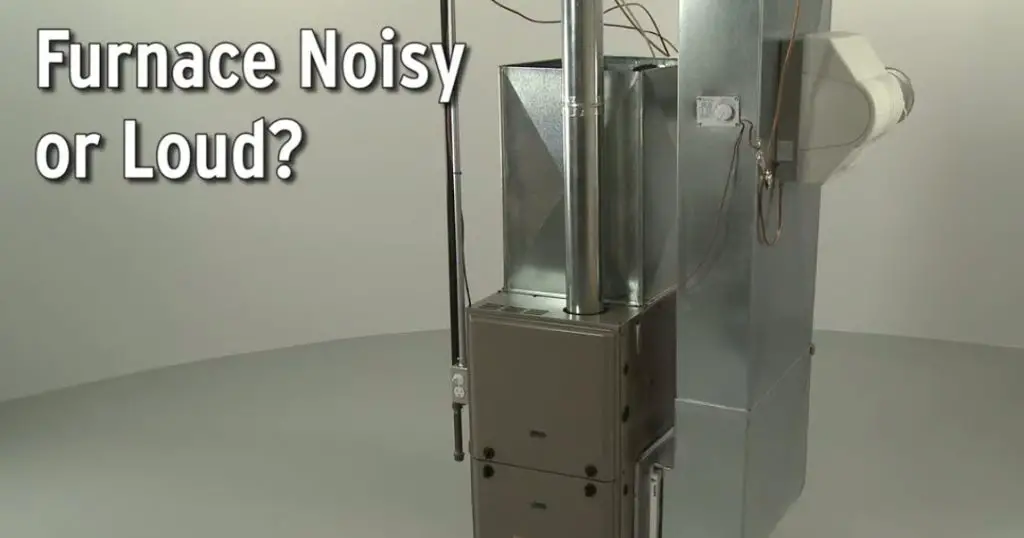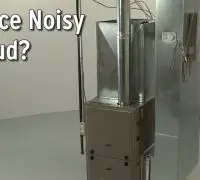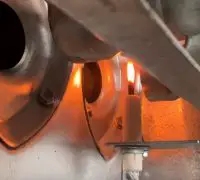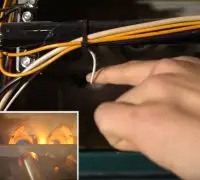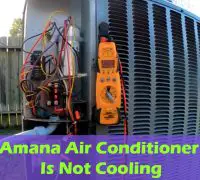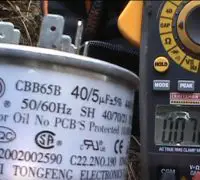If your furnace starts making loud and unusual noises, you need to identify the source of the sound to solve the problem. Noise can signal severe issues and even damage inside the furnace. Since the furnace includes several components, each can make a typical sound when something’s wrong with them.
Needless to say, you should never ignore the loud noises coming from the furnace. Commonly, the noises can be pretty loud, so you won’t be able to ignore them for a long time, even if you want to. A furnace could be noisy for many reasons, some with easy fixes and some requiring professional assistance. From a dirty filter to a defective blower wheel or a heat exchanger crack, many problems can make your furnace loud.
Page Table of Contents
- What makes a furnace loud?
- Air pressure: Banging, knocking, and similar
- Dirty air filters: Whistling or screeching
- Defective blower motor: screeching or rattling
- Dirty burners: Banging
- Faulty blower belt: squealing
- Defective Heat Exchanger: Rattling
- Small Ducts or Gaps in Your Ductwork: whistling
- The ductwork is flexing: banging
- A loose screw: rattling
- Instead of a conclusion
What makes a furnace loud?
We should start by noticing that not all loud noises are coming from the furnace, so make sure they do before attempting to troubleshoot it. The HVAC system includes several parts that could get defective and make a sound when the furnace is operating. Let’s see the everyday noises that signal that something’s not right with your furnace.
Air pressure: Banging, knocking, and similar
When there’s something wrong with the ducts, there will be a lot of noise when the furnace is running. Such noises from the ductwork are:
- Banging
- Rattling
- Popping
- Whistling
- Knocking
- Screeching
When air pressure builds up, it can cause banging, rumbling, or popping noises. It happens because the metal expands and contracts when the furnace starts up. As airflow starts to decrease and the pressure reduces, the walls of the ducts will go back into place and make the popping sound.
Something is wrong when you hear banging, knocking, or squeaking sounds in the furnace. Closed supply vents can cause pressure build-up. When several vents in the system are closed, there will be loud noises, and the system will struggle to work.
The fix
You can set up larger ducts to get more air volume—it’s an excellent but expensive solution. You can also lower the fan speed to decrease static pressure or install high-velocity registers or grills.
Dirty air filters: Whistling or screeching
The air filters are dirty if you hear whistling or screeching from your furnace. Dirt and debris can clog the filters and obstruct the proper airflow. The system will start making a lot of whistling and screeching sounds. It happens because air tries to push itself through blocked openings. Apart from the loud noise, you risk damaging the furnace if you postpone fixing it.
The fix
It would help if you made a routine of changing or cleaning the air filters. Most manufacturers recommend checking out the filters every three months. It would help if you cleaned or replaced the air filters as often as necessary.
Defective blower motor: screeching or rattling
If you hear rattling or screeching noises, there might be a problem with your furnace’s blower motor. The motor itself or the bearings could have developed an issue. The blower motor has to push warm from the furnace through the ducts and out the supply vents. If something is wrong with the motor or the bearings, a loud sound will be heard throughout the house.
The fix
The blower motor needs maintenance and lubrication is part of the regular maintenance. If the blower motor isn’t lubricated, the fan will seize up and burn out.
Dirty burners: Banging
A loud bang from the furnace when you turn it on could occur because of delayed ignition or dirty burners. If the ignition is delayed, gas will build up and cause the bang or the booing sound. An imbalance in the air-to-fuel ratio can also generate sound. Either way, it’s not a problem that goes away on its own, and you must manage it as soon as possible.
The fix
Contact a reliable HVAC technician to manage the situation. Gas furnace burners enquire cleaning as part of the regular furnace maintenance. However, cleaning the burners is something better left to the professionals.
Faulty blower belt: squealing
When the blower belt is loose or damaged, it will make a squealing sound, similar to the fan belt on your car. The belt on the motor goes through intense wear and tear and will require adjusting or replacement after some time. When a certified HVAC technician runs maintenance for your furnace, he will also include belt tuneup.
The fix
To tighten the belt, one has to loosen the motor adjusting screws. This way, you can pull the motor away from the blower pulley. Afterward, you will be able to adjust the belt tension.
Defective Heat Exchanger: Rattling
A crack or leak in the heat exchanger will make the furnace rattle. When the furnace is at the end of its life, the risk for the heat exchange to crack is relatively high. A cracked heat exchange on a new furnace can cause an obstructed airflow. The heat will build up within the heat exchanger and eventually crack it. This is a serious problem; you should never postpone fixing it, as it can generate a lethal carbon monoxide leak.
The fix
If you suspect the rattling sound comes from the cracked heat exchanger, we advise contacting a certified HVAC technician.
Small Ducts or Gaps in Your Ductwork: whistling
Any gaps in the ductwork will produce a whistling noise. Most of the time, you can trace it back to the connection between the furnace and the ducts. If the ducts are too small for the air pushed through them, a whistling sound may also occur.
The fix
Unless you’re a plumber, you shouldn’t attempt to replace the ducts alone. Call the professionals, but not those who installed the furnace and the ducts the first time.
The ductwork is flexing: banging
The ductwork will flex when there are pressure changes between the return and supply ducts. Also known as “oil-canning,” the situation appears when there’s a weak spot in the ducts and requires reinforcement. Keep in mind that ducts, especially old ones, are a conduit for sound, so that they will make strange pop or ping noises.
When the banging is continuous, the ducts are oil-canning.
The fix
Call the pros to assess the situation. You can give them a hand by tracing the sound to find where the banging starts.
A loose screw: rattling
Rattling noises are tricky as they can be a super easy fix or signal a severe issue.
The fix
The easiest fix is to tighten up all loose screws. If they’re not nice and tight, they can get pretty loud. Turn off the furnace, and use a screwdriver to tighten the screws on the side of the furnace. Don’t hesitate to call the professionals if you feel it’s too much for you.
If tightening the screws doesn’t give results, you will need to look further to detect the problem.
Instead of a conclusion
We want to highlight that even if your furnace doesn’t make any noise, it can still have some less noticeable problems, such as carbon monoxide leaks. Carbon monoxide is colorless, odorless, and tasteless but lethal when inhaled. A crack in the heat exchanger can cause carbon monoxide leaks and poisoning. Dizziness, nausea, and fainting are symptoms of carbon monoxide poisoning. You should schedule maintenance with the professionals for your furnace. It’s the best way to stay safe with your furnace.
